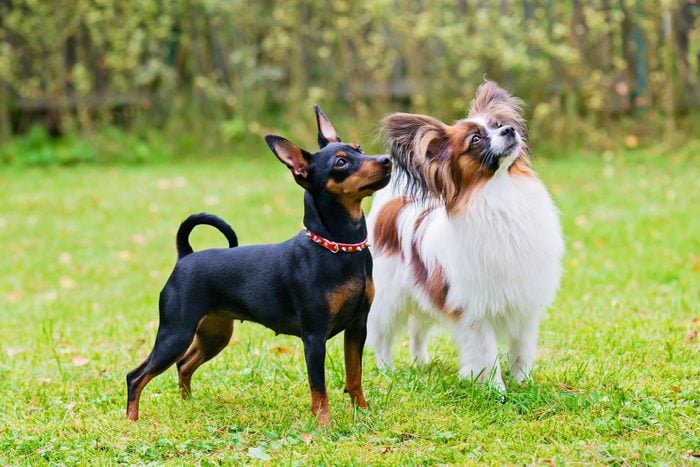Poodles are one of the most intelligent and versatile dog breeds, known for their elegant appearance and delightful personalities. With their hypoallergenic coats and remarkable trainability, they have become a favorite among dog lovers worldwide.
This guide explores everything you need to know about Poodles, from their fascinating history to their care needs, helping you decide if this extraordinary breed is the right fit for you.
Table of Contents
Introduction to Poodles
Poodles are an iconic breed celebrated for their beauty, intelligence, and adaptability. Available in three sizes—Standard, Miniature, and Toy—Poodles can suit various living environments and lifestyles.
Despite their reputation as show dogs, Poodles were originally bred as water retrievers and retain their active, playful nature. Their hypoallergenic coat is another reason they’re highly sought after, particularly for families with allergies.
History and Origin of Poodles
Poodles originated in Germany over 400 years ago, where they were bred as waterfowl hunting dogs. The breed’s name comes from the German word “Pudel,” meaning “to splash in water.” However, they gained their iconic status in France, where they became a favorite among the nobility.
The elaborate Poodle trims seen in historical paintings were initially designed for practical purposes, allowing the dogs to swim efficiently while protecting vital organs from cold water. Over time, their elegance and intelligence made them popular companions for royalty and circus performers alike.
Why Poodles Were Created
Poodles were originally bred for their retrieving skills, excelling in waterfowl hunting due to their athleticism and waterproof coats. Their intelligence and trainability later made them ideal for other roles, including truffle hunting, performing in circuses, and serving as loyal companions.
Today, they continue to excel in various roles, from service and therapy work to agility and obedience competitions.
Physical Characteristics of Poodles
Poodles come in three distinct sizes:
- Standard Poodles: Over 15 inches tall and weighing 40-70 pounds.
- Miniature Poodles: 10-15 inches tall and weighing 10-15 pounds.
- Toy Poodles: Under 10 inches tall and weighing 4-6 pounds.
All Poodles share a curly, dense coat that is low-shedding and often described as hypoallergenic. They have a proud stance, long necks, and an alert, intelligent expression. Their coat colors include white, black, apricot, cream, red, and more, with some featuring multi-colored patterns.
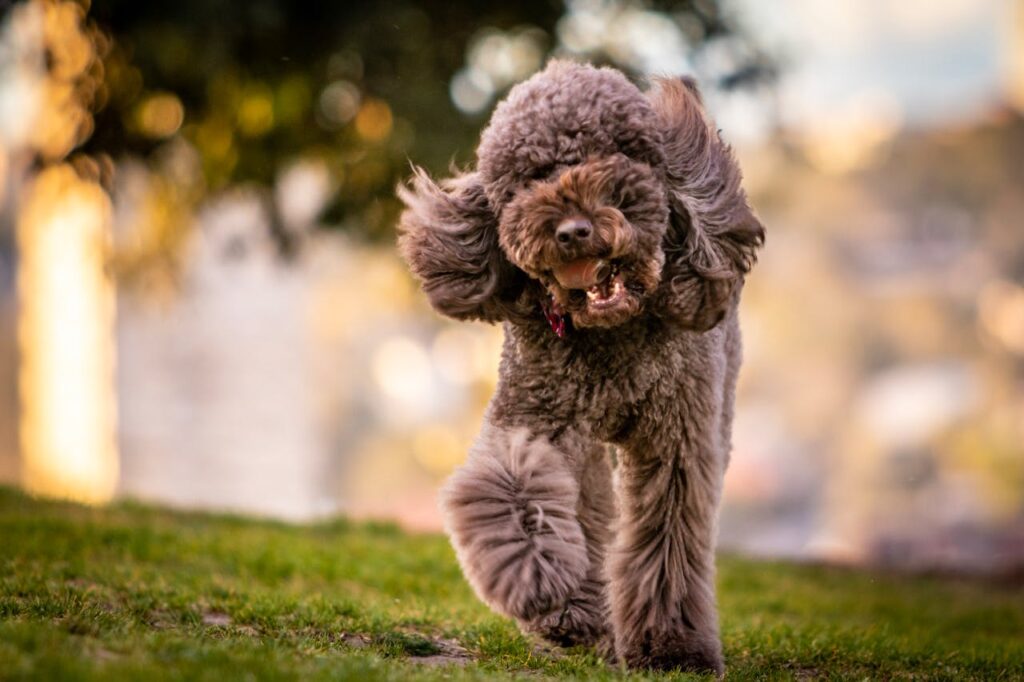
Temperament and Personality of Poodles
Poodles are intelligent, affectionate, and eager to please, making them excellent family pets. They are highly adaptable and thrive in various environments, from bustling households to quieter settings. While they are friendly and social, they can be reserved with strangers, a trait that makes them attentive watchdogs.
Poodles form strong bonds with their families and enjoy participating in activities, whether it’s playtime, training sessions, or cuddling on the couch. Their playful and mischievous side often endears them to their owners.
Bite Force and Jaw Strength
Poodles have a gentle mouth, an essential trait for carrying a game without causing damage, as they were originally bred for retrieving. This characteristic also makes them ideal for games like fetch and ensures they interact safely with children and smaller pets.
While not known for their jaw strength, their ability to handle objects delicately yet securely showcases their remarkable control.
Choosing the Right Poodle Puppy
Selecting a Poodle puppy involves careful research and planning. Start by finding a reputable breeder who prioritizes health testing for common conditions such as hip dysplasia, progressive retinal atrophy (PRA), and Addison’s disease.
Visiting the breeder’s facility allows you to assess the environment and meet the puppies’ parents, giving you insights into their temperament and health.
Look for puppies that are curious, playful, and confident. Avoid overly shy or aggressive individuals, as these traits can indicate potential behavioral issues. Be prepared to invest time in grooming, training, and socializing your Poodle to ensure they develop into a well-rounded companion.
For more tips on choosing the perfect puppy, explore our “Guide to Choosing Your Dream Puppy”.
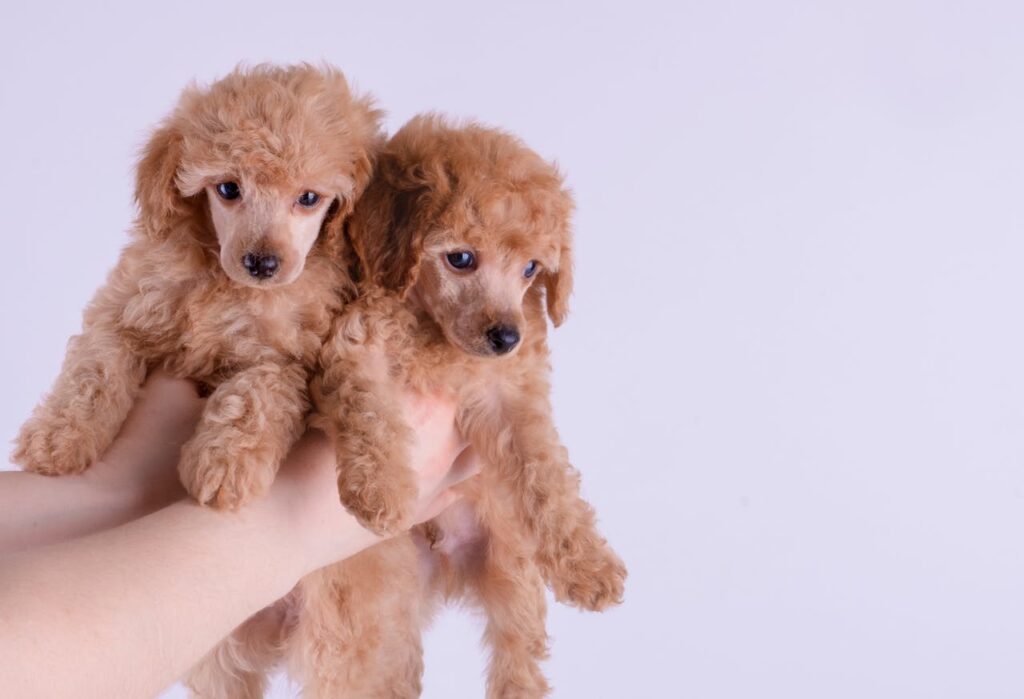
Intelligence and Training of Poodles
Poodles rank among the smartest dog breeds, making them highly trainable. Their eagerness to please, coupled with their quick learning abilities, ensures they excel in obedience and agility training. Consistent positive reinforcement methods work best with Poodles, as they respond well to rewards and encouragement.
Socialization is crucial for Poodle puppies to help them grow into confident adults. Introducing them to various people, environments, and experiences early on can prevent fearfulness and anxiety.
Exercise and Energy Levels
Despite their elegant appearance, Poodles are energetic dogs that require regular exercise to stay healthy and happy. Standard Poodles, in particular, have higher energy levels and benefit from activities like jogging, swimming, or playing fetch. Miniature and Toy Poodles also need daily exercise, though their needs can be met with shorter walks and indoor play sessions.
Mental stimulation is equally important for Poodles. Interactive toys, puzzle feeders, and training sessions can keep their sharp minds engaged and prevent boredom.
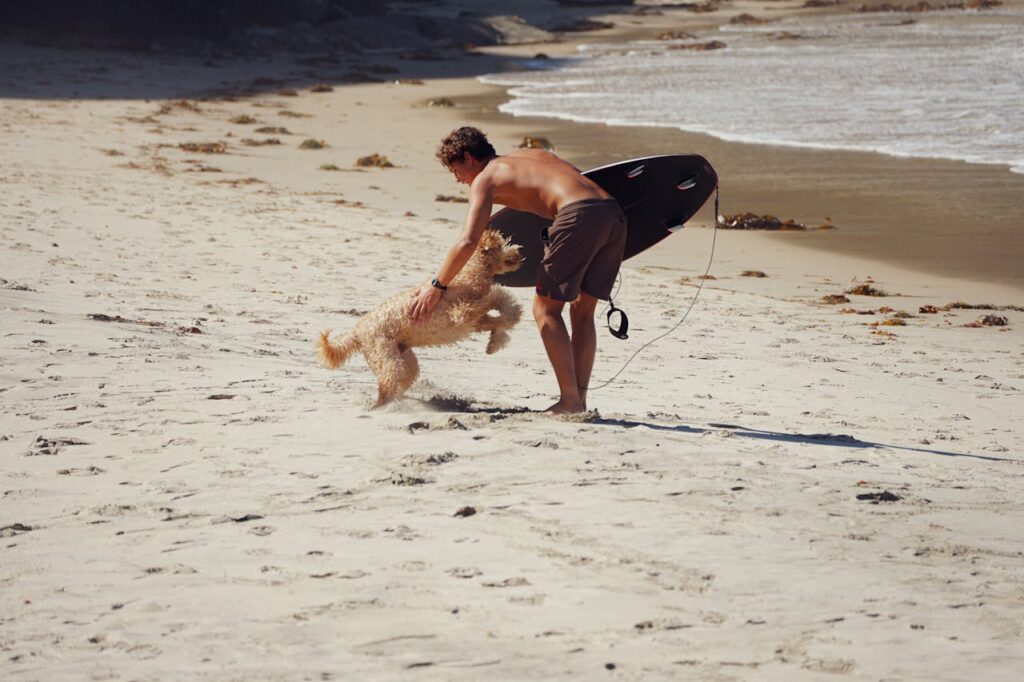
Diet and Nutrition
Poodles require a balanced diet tailored to their size, age, and activity level. High-quality commercial dog food, whether dry or wet, is a convenient option. Ensure the food contains essential nutrients like proteins, fats, vitamins, and minerals. Avoid overfeeding, as Poodles can be prone to obesity, which may lead to health issues.
For those who prefer homemade meals, consult a veterinarian or canine nutritionist to ensure your dog receives the right balance of nutrients. Freshwater should always be available to keep your Poodle hydrated.
Health and Lifespan
Poodles are generally a healthy breed, with a lifespan of 12-15 years. However, they are prone to certain genetic conditions, such as hip dysplasia, PRA, epilepsy, and Addison’s disease. Regular veterinary check-ups, a nutritious diet, and an active lifestyle can help mitigate these risks.
Dental care is especially important for Toy and Miniature Poodles, as smaller breeds are more susceptible to dental issues. Brush their teeth regularly and provide dental chews to maintain oral health.
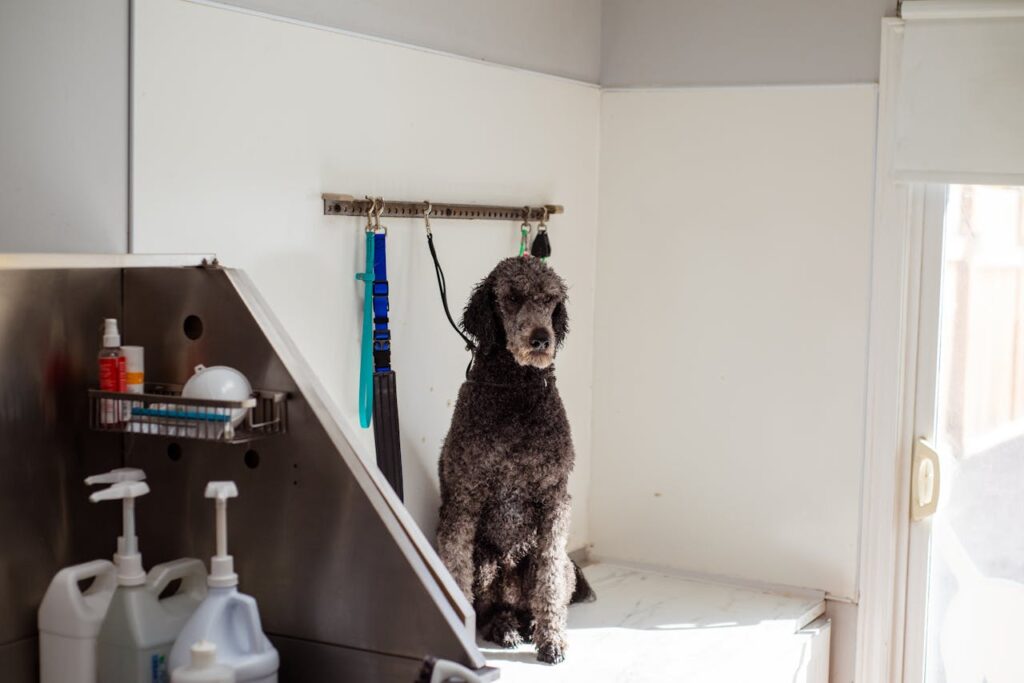
Grooming and Coat Care
Poodles’ curly coats require regular grooming to prevent matting and maintain their elegant appearance. Professional grooming every 4-6 weeks is recommended, along with weekly brushing at home. Their coats can be styled in various trims, from the classic “Continental” to the practical “Sporting” clip.
In addition to coat care, Poodles need regular nail trimming, ear cleaning, and teeth brushing. Proper grooming not only keeps them looking their best but also contributes to their overall health and comfort.
Working Roles and Versatility
Poodles excel in a wide range of roles due to their intelligence, agility, and adaptability. They are often seen as therapy dogs, assisting individuals with physical or emotional needs. Their keen sense of smell makes them effective in search-and-rescue missions, while their agility and trainability allow them to shine in dog sports like obedience, agility, and rally.
Their history as performers in circuses also highlights their playful and entertaining nature. Poodles’ versatility ensures they can adapt to various lifestyles and activities, making them a delightful addition to any household.
Fun Facts About Poodles
- Poodles are the national dog of France.
- They have been featured in numerous movies and TV shows due to their elegant appearance.
- Famous Poodle owners include Elvis Presley, Marilyn Monroe, and Walt Disney.
- Poodles are natural swimmers, thanks to their water-repellent coats and webbed feet.
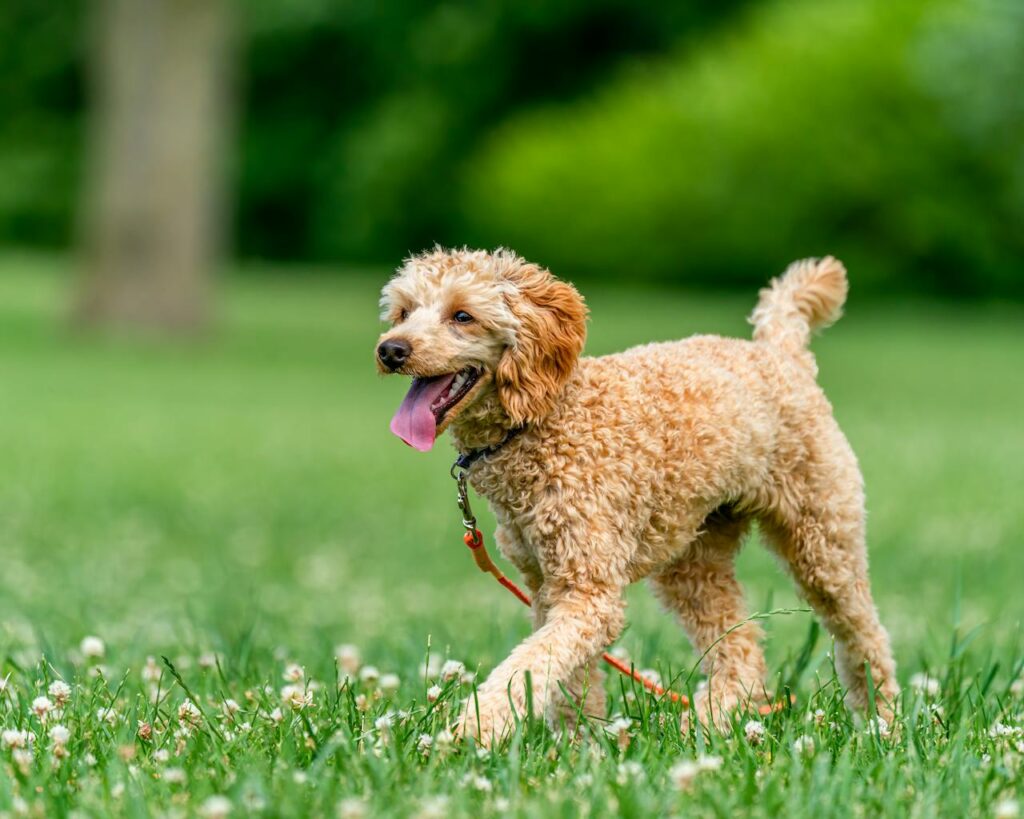
Challenges of Owning a Poodle
While Poodles are wonderful companions, they do come with certain challenges. Their grooming needs can be time-consuming and costly, requiring regular professional care. Their intelligence and energy levels mean they need plenty of mental and physical stimulation to prevent boredom, which can lead to destructive behavior.
Poodles may also be prone to separation anxiety, as they form strong bonds with their owners. Ensuring they receive proper training and socialization from an early age can help mitigate these challenges.
Tips for Potential Owners
- Research the different sizes of Poodles to determine which one best suits your lifestyle.
- Ensure you have the time and resources to meet their grooming, training, and exercise needs.
- Adopt a reputable breeder or rescue organization to ensure you bring home a healthy, well-adjusted dog.
- Invest in training and socialization to help your Poodle thrive as a confident and well-mannered companion.
Poodle Puppies: What to Expect
Poodle puppies are curious, playful, and energetic. They require plenty of socialization, training, and patience during their early months. Crate training can help with housebreaking and provide a safe space for your puppy. Begin basic obedience training early, using positive reinforcement techniques to build a strong bond.

Breeding and Reproduction
Breeding Poodles responsibly involves thorough health testing to ensure genetic issues are not passed on to offspring. Breeders should prioritize temperament, health, and conformation to breed standards. Pregnant Poodles require special care, including a balanced diet, regular vet check-ups, and a comfortable whelping area.
Socializing and handling puppies from an early age helps them grow into well-adjusted adults. Prospective breeders must be prepared for the responsibilities and challenges of raising a litter.
Final Thoughts on Poodles
Poodles are truly remarkable dogs, combining intelligence, elegance, and versatility in one delightful package. Whether you’re looking for a loyal family pet, a competitive athlete, or a loving companion, Poodles can meet and exceed your expectations.
For more information on other fantastic breeds, check out our “Labrador Retriever”, “French Bulldogs”, “Golden Retriever” and “German Shepherd” to explore the unique qualities of this popular and equally amazing breed.
FAQs
What are the different types of Poodles?
Poodles come in three main sizes: Standard, Miniature, and Toy. While their sizes vary, all three share the same intelligence, elegance, and curly coat that make the breed iconic.
Are Poodles hypoallergenic?
Yes, Poodles are considered hypoallergenic. Their curly coat traps dander and hair, reducing shedding and making them a good option for people with allergies.
How often do Poodles need grooming?
Poodles require regular grooming, typically every 4 to 6 weeks. Their curly coat can easily mat, so daily brushing is recommended to keep their fur in top condition.
Are Poodles good with children and other pets?
Yes, Poodles are generally friendly and adaptable, making them great family pets. They are known for being gentle with children and getting along well with other animals, provided they are socialized properly.
How much exercise does a Poodle need?
Poodles are energetic and need daily exercise, such as brisk walks, playtime, or agility training. Standard Poodles, in particular, benefit from more vigorous activities to stay physically and mentally stimulated.


